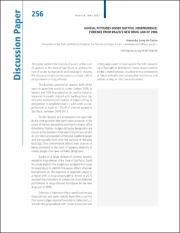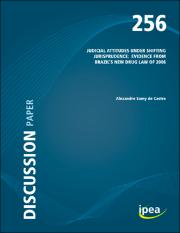Please use this identifier to cite or link to this item:
https://repositorio.ipea.gov.br/handle/11058/10610Files in This Item:
| File | Description | Size | Format | |
|---|---|---|---|---|
| dp_256_sumex.pdf | 123.24 kB | Adobe PDF |  View/Open | |
| dp_256.pdf | 4.38 MB | Adobe PDF |  View/Open |
| Title: | Judicial attitudes under shifting jurisprudence : evidence from Brazil’s new drug law of 2006 |
| Other Titles: | Discussion Paper 256 : Judicial attitudes under shifting jurisprudence : evidence from Brazil’s new drug law of 2006 Atitudes judiciais sob mudança de jurisprudência : evidências da nova lei de drogas do Brasil em 2006 |
| Authors: | Castro, Alexandre Samy de |
| Abstract: | This paper exploits the diversity of panels at the court of appeals in the state of São Paulo to address the role of career backgrounds and ideology in shaping the response of judicial decisions to a major shift in jurisprudence on drug offenses. The Brazilian constitution reserves 80% of the seats in appellate courts to career judges, 10% to lawyers and 10% to prosecutors. In practice however, vacancies in panels coupled with backlogs have significantly increased participation of judges sitting by designation in appellate panels - who acted as rapporteurs in as much as 14% of all criminal appeals in Sao˜ Paulo, between 2009-2013. Former lawyers and prosecutors are appointed by the state governor after nomination processes at the bar association and at the ministerial office. Judges sitting by designation are chosen at the discretion of the court’s highest council and do not retain prerogatives of tenured appellate judges and are typically hired with the purpose of reducing backlogs. Their performance affects their chances of being promoted to the court of appeals, relatively to similar judges that have not been designated. Based on a large dataset of criminal appeals related to drug offenses in the State São Paulo, Brazil, this study exploits the exogenous assignment of cases to rapporteurs, to identify the causal effects of career backgrounds on the response of appellate judges to a major shift in drug jurisprudence, which revoked the prohibition of conversion of confinement punishment in drug offenses introduced by the new drug law of 2006. Estimates of treatment-effects, conditional on case characteristics and panel-specific fixed-effects, confirm that career judges respond favorably to defendants, in line with the jurisprudence shift. Former prosecutors react against the shift, responding unfavorably to defendants. Former lawyers tend to exhibit a mixed behavior, weighing in their preferences as well as strategically favoring predominant “law and order” views. Finally sitting judges behave in a diffident fashion but also favoring prosecution. |
| metadata.dc.rights.holder: | Instituto de Pesquisa Econômica Aplicada (Ipea) |
| metadata.dc.rights.license: | Reproduction of this text and the data it contains is allowed as long as the source is cited. Reproductions for commercial purposes are prohibited. |
| metadata.dc.type: | Discussion Paper |
| Appears in Collections: | Direito. Legislação: Livros |
Items in DSpace are protected by copyright, with all rights reserved, unless otherwise indicated.

